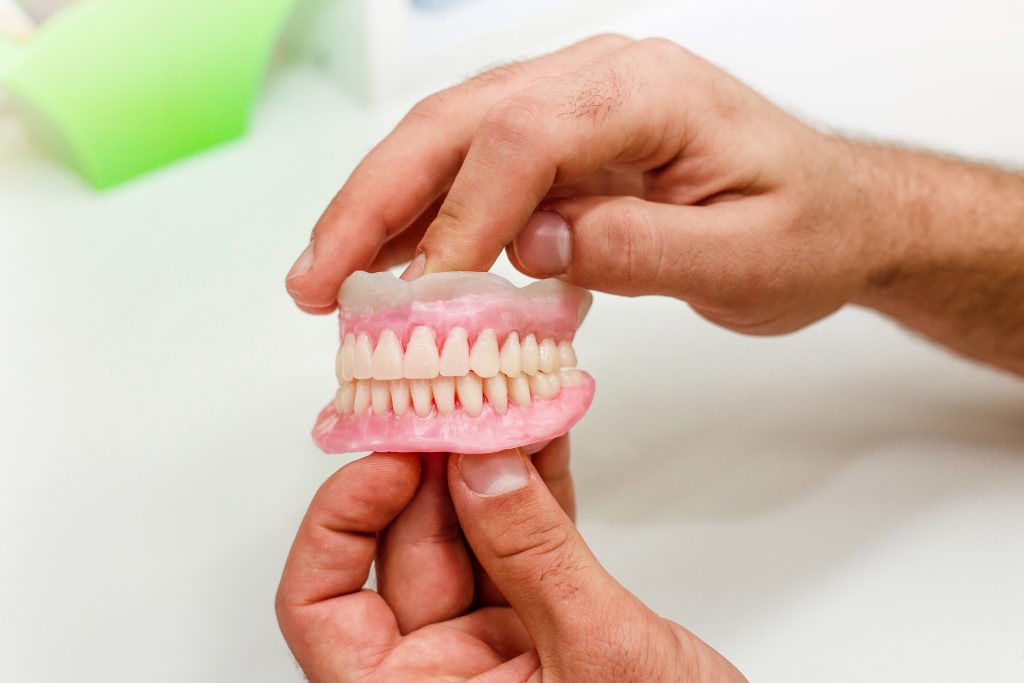Dentures are designed to restore function and appearance, but they are not a full replacement for natural teeth and will require ongoing maintenance. The average lifespan of dentures is often discussed as five to eight years, though this timeframe varies significantly depending on individual oral health and care. Dentures gradually change in fit and function as the mouth and jawbone shift over time, making adjustments or replacement necessary. Understanding denture longevity helps patients plan for future dental care needs and maintain long-term oral comfort.
Recognising that dentures require maintenance allows patients to plan appropriately for oral health rather than viewing them as a one-time cosmetic option. Regular dental assessments can identify when relining or replacement may improve comfort and function. Considering the durability of dentures helps with budgeting for ongoing dental care and reducing unexpected issues. Positioning denture use within overall oral health supports practical and health-focused planning for the future.
Summary of the Content:
- Dentures generally last several years, but their durability varies depending on denture type, material quality, and oral care practices. Regular dental checkups help maintain the fit and function of your teeth.
- Full dentures are designed to replace an entire arch of teeth and typically remain functional for years. Their condition depends on hygiene and professional adjustments.
- Partial dentures are used when some natural teeth remain, and their longevity depends on maintenance. Professional monitoring helps maintain their comfortable fit over time.
- Implant-supported dentures are designed to enhance stability by anchoring to dental implants. With good oral hygiene and consistent dental checkups, these dentures may remain serviceable for an extended period.
- Immediate dentures are temporary and support patients after extractions. They usually require relining or replacement once healing is complete.
- Daily wear, oral changes, and hygiene habits influence denture longevity. Professional assessment allows for timely interventions that maintain comfort and oral health.
Average Lifespan of Different Denture Types
Understanding the average lifespan of dentures is important for planning, budgeting, and supporting long-term oral health. Different types of dentures vary in durability, function, and the level of care required. Below is a breakdown of the typical ranges and key considerations.
- Full Dentures (Complete Dentures):
Full dentures, also called complete dentures, replace an entire arch of missing teeth. Their average lifespan is five to eight years, depending on material, use, and care. Oral hygiene habits, daily cleaning, influence the durability, and whether patients attend regular dental checkups with a dental professional. - Partial Dentures:
Partial dentures are used when several missing teeth remain alongside natural teeth. Their general lifespan depends on denture durability, proper maintenance, and ongoing dental care. Ill-fitting dentures may need adjustments or replacement sooner, which highlights the importance of regular visits to assess changes in the mouth and gums. - Implant-supported dentures:
Implant-supported dentures are anchored by dental implants, and with good oral hygiene and professional cleaning, they can last for years. With proper cleaning and denture care products, implant-supported dentures can remain durable for many years. These dentures are designed to improve stability and function by attaching to dental implants, which may offer additional support for some patients. Regular checkups with a dentist help maintain denture longevity. - Immediate Dentures (Temporary Dentures):
Immediate dentures, sometimes called temporary dentures, are provided right after tooth loss or extractions and are intended as a short-term option during the healing time. Due to changes in the jaw and gums, these dentures may need to be relined or replaced within a few months. They serve as a transition until new dentures or conventional dentures can be fitted properly.
The lifespan of dentures varies widely depending on the type, denture material, oral health, and daily habits. A denture consultation with a dental professional and regular maintenance will help maintain dentures so they fit comfortably, function well, and remain in good condition.
Factors That Influence How Long Dentures Last
A combination of physical, biological, and lifestyle factors influences the longevity of dentures. Each element plays a role in determining how well dentures function over time. Understanding these influences highlights the importance of consistent professional care and responsible daily maintenance to maintain long-term oral health.
Denture Material and Quality
The average lifespan of dentures depends on several factors, such as denture material and denture durability, which directly influence their function and long-term condition. Acrylic complete dentures typically experience more wear and tear over time when compared with other types of dentures, making regular dental checkups important. Flexible partial dentures may offer comfort but can be less durable over time, especially when subjected to daily cleaning and routine tasks like chewing. Implant-supported dentures are designed to be anchored to implants in the jaw, which may improve stability for some patients.
Immediate dentures and temporary dentures are designed as short-term denture options, often used while gums heal before fitting conventional dentures or replacement dentures. Regardless of design, proper cleaning with a denture brush, soft-bristle toothbrush, or non-abrasive denture cleanser is essential to prevent bacterial growth and maintain oral health. Storing dentures in a denture soaking solution or warm water helps maintain the denture surface and prevents damage resulting from dryness or cracking. Regular visits allow your dentist to evaluate whether you fit comfortably, detect ill-fitting dentures, and recommend adjustments or new dentures when necessary.
Changes in the Mouth and Jawbone
Natural changes in the mouth and jawbone can affect how well dentures fit as time passes. Bone resorption, a gradual shrinking of the jawbone, naturally occurs. This process can make dentures feel loose, creating discomfort or difficulty with speaking and chewing. Gum tissues may also change shape or thickness, further altering how securely dentures sit.
As the jawbone and gums adjust, dentures that once fit comfortably may no longer provide proper stability. Poorly fitting dentures can increase the risk of sore spots. Over time, this may also place added pressure on remaining oral structures. Regular dental checkups are important to assess fit and determine whether relining or replacement is required.
Daily Wear and Lifestyle Habits
Daily wear and lifestyle habits significantly influence the comfort and longevity of dentures. Regular chewing places natural pressure on dentures, which can affect their stability over time. Speaking also contributes to daily use, as consistent articulation gradually impacts fit and performance. Gentle awareness of these activities helps patients understand why professional reviews are essential for maintaining comfort.
Grinding or clenching habits can place additional stress on dentures, leading to wear or small fractures. Similarly, dietary choices, including hard or sticky foods, may shorten their lifespan. A balanced approach to food selection helps maintain function and denture durability. Regular dental checkups provide an opportunity to adjust or reline dentures, maintaining their ability to fit well and help maintain oral health.
Oral Hygiene and Denture Care Practices
Good oral hygiene and proper denture care are essential for maintaining comfort, function, and overall oral health. Dentures should be cleaned daily with appropriate non-abrasive cleaners. Proper handling is important, as dropping dentures may cause fractures or misalignment. Regular dental checkups allow timely adjustments that support a secure fit and prevent discomfort.
Patients should avoid attempting any do-it-yourself alterations to their dentures. Such practices may damage the appliance and risk oral injury or infection. Only a qualified dental professional can assess when adjustments, relining, or replacement are required. Seeking regular professional care helps keep dentures functional, comfortable, and hygienic.
Signs Your Dentures May Need Replacement
Here are some indicators that may suggest your dentures are due for replacement. These points are provided for general education only, and a dentist is the only person who can confirm whether new dentures are required.
- Looseness or Poor Fit:
Dentures that feel loose or no longer sit securely in the mouth may indicate changes in the underlying bone and gums, which can affect stability. - Persistent Discomfort or Irritation:
If dentures begin to cause ongoing soreness, rubbing, or ulcers despite proper cleaning and adjustments, this may suggest they are no longer fitting as intended. - Visible Cracks, Chips, or Wear:
Damage such as cracks, chips, or worn-down teeth on the denture can affect function and hygiene, and may signal the need for replacement. - Changes in Bite or Chewing Ability:
Difficulty chewing or changes in the way your upper and lower teeth meet may indicate that dentures are wearing out. Altered speech or reduced comfort can also suggest that dentures are no longer aligned properly. - Staining or Odour That Does Not Improve with Cleaning:
Long-term build-up or deterioration of denture materials may make them more difficult to clean, which can be another reason to consider replacement.
Recognising these signs early can help you maintain comfort and function, but only a qualified dentist can determine whether your dentures should be adjusted or replaced.
How to Prolong the Lifespan of Dentures
Maintaining dentures with the right care can help improve their comfort, function, and longevity. While dentures have a limited lifespan, the following strategies may help you get the most from them.
- Commit to Proper Cleaning Routines:
Dentures should be cleaned daily using a soft brush and denture-specific cleaner, rather than regular toothpaste, to prevent scratches and maintain hygiene. - Follow Denture Storage Guidelines:
When dentures are not being worn, they should be stored in clean water or a denture solution to prevent warping or drying out. - Attend Regular Dental Checkups:
Regular dental visits allow for timely adjustments or relining, which help dentures fit comfortably as natural changes occur in the mouth and jaw over time. - Avoid At-Home Modifications:
Dentures should not be adjusted at home, as this may cause damage or lead to discomfort; only a qualified dental professional can provide modifications.
With consistent care and regular professional input, dentures can remain functional. This information is provided as a general guide and is not a substitute for personalised advice from your dentist.
Professional Assessment and Regular Dental Checkups
Regular dental checkups are essential for maintaining the comfort and function of dentures over time. Dentists can assess changes in the mouth and recommend appropriate adjustments. Professional evaluations help identify issues like looseness, wear, or gum irritation before they worsen. This proactive approach supports oral health and helps keep dentures functional for daily use.
Relining or replacements may be necessary as the mouth and jawbone naturally change with age. Dentists can determine when these interventions are appropriate. Consistent reviews also help detect potential problems that may not be obvious to patients. Booking routine consultations provides tailored professional advice.




